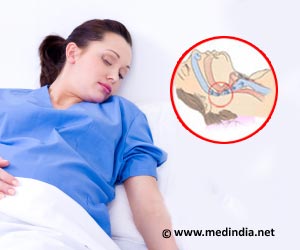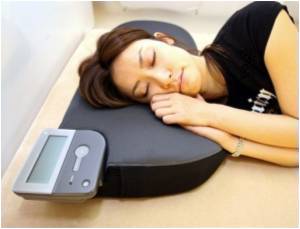A novel device implanted under the skin like a pacemaker successfully in heart failure patients helps treating central sleep apnoea (CSA).

He added: "Patients using the device tell us they haven't slept so well in years. They have more energy and can do their normal daily activities without falling asleep. They also don't have to fight with a mask."
CSA is a comorbidity in approximately 35% of heart failure patients and doubles the risk of death. Until now there was no proven treatment. The remede® system uses unilateral transvenous phrenic nerve stimulation to prevent CSA before it occurs. The pulse generator is implanted under the skin like a pacemaker, just below the collar bone, and a wire is threaded into one of the veins near the phrenic nerve.
Professor Abraham said: "The device stimulates the diaphragm via the phrenic nerve, causing the diaphragm to contract. It regularises the patient's breathing pattern throughout the night, rather than waiting until the patient stops breathing to react."
The remede® system pilot study was a prospective, multicentre trial in 46 patients with moderate to severe CSA who were implanted with the remede® system. The primary endpoint was a reduction in apnoea hypopnea index (AHI) at three months compared to baseline with six and 12 month data also collected.
The one year results, revealed today, show that the remede® system led to substantial benefits in sleep parameters including a reduction in AHI, a reduction in the time spent with low blood oxygen levels overnight, and improvements in sleep efficiency and REM sleep.
Advertisement
Professor Abraham said: "Patients with the remede® system feel better, they are less symptomatic, their quality of life is improved, and the underlying mechanisms that lead to heart failure progression such as autonomic imbalance are improved."
Advertisement
He continued: "The major problem with mask based therapies such as continuous positive airway pressure (CPAP) is patient acceptance and compliance. Up to 50% of patients can't or won't wear a mask so their sleep apnoea is untreated or inadequately treated."
Professor Abraham concluded: "All heart failure patients should be screened for sleep apnoea and those with OSA should be offered a mask based therapy. Patients with CSA are good candidates for the remede® system which can improve their sleepiness, quality of life and potentially their clinical outcomes."
The pivotal trial for US regulatory approval is ongoing and is set to enroll around 150 patients in the US and Europe. Results are expected by the end of 2015.
Source-Eurekalert















